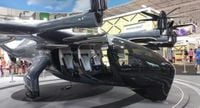The United States is gearing up for a new era in aviation, as the Trump administration launches a bold federal initiative to bring electric air taxis—known as eVTOLs—closer to reality. Announced on September 14, 2025, by the Department of Transportation, the Electric Vertical Takeoff and Landing Integration Pilot Programme (eIPP) marks the nation’s most ambitious effort yet to fast-track the integration of these futuristic aircraft into American airspace.
The eIPP, a three-year pilot program, aims to establish new frameworks and regulations for the safe operation of eVTOLs while fostering collaboration between the public and private sectors. According to the Department of Transportation, at least five pilot initiatives will be selected, focusing on both piloted and unmanned operations for passenger transport, cargo delivery, and emergency response scenarios—including airlift and medical transport. The Federal Aviation Administration (FAA) will oversee the initiative, which is designed to test real-world capabilities of eVTOLs before they receive full FAA certification—a process that typically takes several years.
The announcement, made on a Friday, signals a significant move to position the United States at the forefront of aerial mobility. "The next great technological revolution in aviation is here," said Transportation Secretary Sean Duffy in a statement carried by India Today. "The United States will lead the way, and doing so will cement America’s status as a global leader in transportation innovation. That means more high-paying manufacturing jobs and economic opportunity." The administration’s intent is clear: reinforce U.S. leadership in advanced aviation technology while spurring economic growth and job creation in manufacturing sectors.
Interest in the program has surged from leading eVTOL developers. Joby Aviation, a California-based company that recently received FAA approval to begin test flights, has confirmed its participation. "We’ve spent more than 15 years building the aircraft technology and operational capabilities that are defining advanced aerial mobility, and we’re ready to bring our services to communities," said Joby’s chief policy officer, Greg Bowles, in a statement. "We look forward to demonstrating our aircraft’s maturity and delivering early operations in cities and states nationwide."
Archer Aviation, another major player in the eVTOL space, has also declared its intention to join the pilot scheme. The company, which announced its plans to participate on September 14, 2025, is in talks with United Airlines and select U.S. cities to conduct trial runs of its Midnight aircraft under the program. Archer’s CEO, Adam Goldstein, emphasized the importance of public trust in the new technology, stating, "We’ll demonstrate that air taxis can operate safely and quietly. These early flights will help cement American leadership in advanced aviation and set the stage for scaled commercial operations in the U.S. and beyond." He added that moving toward real-world use shows the U.S. is ready to bring air taxis to market, and that early flights will build trust with the public, according to TipRanks.
The eVTOL Integration Pilot Program, as reported by TipRanks, is the first U.S. plan made exclusively for air taxi firms. It sets up a dedicated track for companies like Archer and Joby to showcase that their technology can operate safely and efficiently in urban environments. The program is expected to inform regulatory development and accelerate the safe adoption of eVTOLs across the country, with trial flights possibly beginning as soon as 2026. These flights will generate data to guide the path toward full-scale commercial use, highlighting the aircrafts’ ability to operate quietly and safely—two factors seen as crucial for gaining local support.
For Archer Aviation, the announcement marks a new phase as it transitions from testing to real-world deployment. The company is working closely with airlines such as United Airlines, which noted its early investment in Archer back in 2021, and said the new program validates its backing of the firm. As Archer prepares for trial runs, its stock responded positively—rising 3% on September 12, 2025, and gaining an additional 1.14% in after-hours trading, as reported by TipRanks. Despite a challenging year for Archer shares, Wall Street analysts remain optimistic, with a "Strong Buy" consensus and an average 12-month price target of $13.14, implying a 50.17% upside from the current price.
The eIPP isn’t the FAA’s first foray into advanced air taxi technology. In June 2023, the agency approved Joby Aviation’s plan to conduct test flights of its electric flying taxi prototype, laying the groundwork for broader industry participation. Now, with the eIPP, both Joby and Archer are re-engaging with federal authorities to bring their aircraft to a wider audience through this new framework. The FAA is currently accepting proposals, as outlined in a forthcoming federal notice, and will ultimately select at least five participants to collaborate with state and local governments, as well as industry partners, to refine operational procedures and demonstrate the effectiveness of eVTOLs in diverse environments.
The results of these pilot projects are expected to have far-reaching implications. Not only will they shape future regulatory approaches, but they will also bolster the United States’ competitive position in the burgeoning global advanced aviation market. The stakes are high: the ability to safely and efficiently integrate air taxis into urban airspace could transform how Americans commute, deliver goods, and respond to emergencies. The promise of high-paying manufacturing jobs and increased economic opportunity looms large, as the country seeks to lead the next chapter in aviation innovation.
Of course, challenges remain. Full FAA certification is a rigorous process, and questions about airspace management, noise pollution, and public acceptance still need to be addressed. But with the federal government, industry leaders, and major airlines all pulling in the same direction, the momentum behind eVTOLs appears stronger than ever.
As the pilot program unfolds over the next three years, all eyes will be on the skies—and on the data these early flights produce. If successful, the eIPP could pave the way for a future where catching an air taxi across town is as routine as hailing a cab. For now, though, the United States is making a decisive bet on innovation, with the world watching to see if it pays off.




